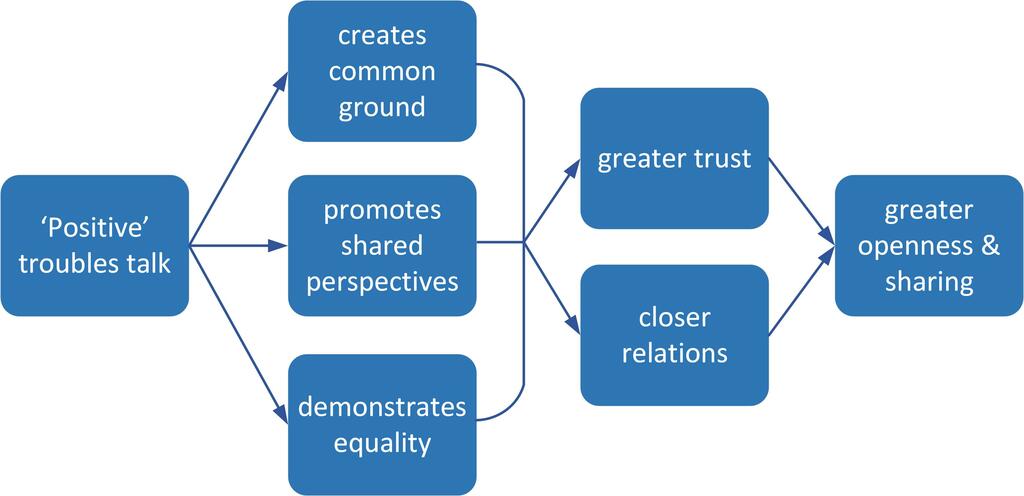
Success or failure in teams is frequently linked with the ways in which team members communicate and relate to each other. Often the focus is on the problems that arise and how they can be handled effectively. But that is just one side of the story. It is also important to know what types of behaviour can impact positively on team relations. A recent study by Debray and Spencer-Oatey[1] identified ‘troubles talk’ as one such behaviour.
What is troubles talk?
‘Troubles talk’ is one kind of complaining. It refers to something negative that a person talks about but does not blame on anyone present. Others then join in and complain together about the issue in hand – something they can all agree on and share as problematic. The topics can range from serious issues to mildly inconvenient matters that affect them all, to concerns that have less or no personal relevance.
Why focus on troubles talk in teams?
The lead researcher in this study did not set out to focus on troubles talk – she just wanted to understand how diverse teams manage their relations. She had the opportunity to study an MBA team over a 9-month period, audio-recording all their team meetings. As she started examining her data, she found that troubles talk stood out as particularly noticeable.
How did the team members ‘do’ troubles talk?
Topics that the team members often complained about were workload, time constraints, and issues with clients. The researchers identified two particularly common features of ‘successful’ troubles talk:
- Self-disclosure of a problem by one member, followed up by disclosure of a very similar problem by another member
- Joint construction of a story around a negative incident or situation they had all experienced or were facing
How did the troubles talk help team relations?
The troubles talk functioned in various positive ways as indicated in this diagram:

How did team members avoid negativity or offence?
Importantly, the team avoided allowing the troubles talk to become unhelpful. Some key tactics were:
- Not to allow the complaining sequence to carry on for too long or become too serious, lest it induce a negative spiral in members’ feelings
- Not to give advice in response to any troubles talk, lest this conveys the impression that some members are more capable than others
- Not to commiserate with the person sharing a trouble, lest this conveys the impression that some members have fewer problems than others
- Not to allow the target of the complaining be any of the team members
Does culture affect troubles talk?
The study did not explicitly investigate this. Nevertheless, the 6-person team that was studied was diverse in two main ways:
- Country culture: Team members were from 5 different countries: India x2, China, Nigeria, UK, Germany/Italy
- Professional background: team members were from 5 different professional backgrounds: marketing, accounting, oil & gas x2, sales, IT consultancy.
Their ages ranged from 25 to 39 and there were 4 males and 2 females.
All participated in the troubles talk and all seemed to benefit equally from it. This may be because it draws on our natural psychological tendency to unite when we are faced with a common ‘enemy’. If focusing on common troubles can become the common enemy, it can support relationship building within the team.
Key takeaways
This is just a single study of one set of team members, who did not know each other previously and who were put together to complete a series of projects. Although the study took place over an extended period of time, we cannot know for sure how widely the findings can be applied to other teams. Nevertheless, other research has also noted its importance and there are some useful takeaways:
- Complaining need not always be negative
- Troubles talk can build team relations if handled appropriately
- This means only complaining about issues that other members can relate to and agree with
- It also means avoiding negativity through responding in ways that avoid any implied inequality and by not letting the troubles talk continue for too long.
Professor Helen Spencer-Oatey, Director
See our Global Teamworking Profiler (GTP) to find out how your team is functioning
References
[1] Debray, C., & Spencer-Oatey, H. (2022). Co-constructing good relations through troubles talk in diverse teams. Journal of Pragmatics, 192, 85–97. Available open access here.

